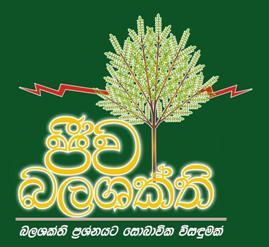The Alternative to Chemical Fertilizers and Pesticides
The Alternative to Chemical Fertilizers and Pesticides – “The Jeewamurtha Concept” in Conformity with the Vision of Ministry of Primary Industries
There is a concerted effort to wean the country away from the use of chemical fertilizers and pesticides, which has received the highest level of support including His Excellency The President. The move towards establishing a “Blue Green Economy”, a much more ambitious goal than the previous policy initiatives such as “Haritha Lanka” has clear objectives of which the gradual reduction of dependence on chemical fertilizers and pesticides takes a central role. In this connection His Excellency has also launched a program to grow One Billion Gliricidia trees, the leaves of which is an essential ingredient for the alternatives to both inorganic fertilizers as well as the toxic pesticides.
The need for maintaining food security in the country is accepted as paramount. Thus attempts have been made to make this change by converting the farmers for the use of organic fertilizers, mainly compost. However, this has failed to achieve the desired objectives due to several causes. The process of centralized compost destroys most of the nutrient value of the end product and therefore very large quantities are required to replace the equivalent amounts of the chemical fertilizers, which makes the change unviable on cost considerations, due to high transport and labour cost, and the extra effort called for by the farmers.
This and unfounded claims that there would be reduction of yield due to the changeover to organic farming techniques have created opposition to this change.
Thus the concept of “Jeewamurtha,” well established in India under the guidance of DrPallekar and his concept of “Zero Input Agriculture” is proposed to be adopted as the means of achieving the target of elimination of the use of inorganic fertilizers and pesticides.
The problem with those who argue against organic or sustainable agriculture are that they have narrowed down the whole concept into “compost”. The principles of this farming system is much more than the substitution or input type agriculture which is the usual practice in modern conventional agriculture. This totally depends on inorganic fertilizer and other agro chemicals. It is important to understand the ecological principles that govern agriculture, which is lacking in present day agriculture and has resulted in the degradation of natural fertility and pollution of water. What we are now trying is to interpret agriculture in terms or ecology and modern science for which we use the term agro-ecology not really different to organic or sustainable agriculture.
This concept has been successfully implemented in many locations in Sri Lanka at farmer level and is well proven for wider promotion.
The method of manufacture of “Jeewamurtha” as a fertilizer and as a pesticide are illustrated in the attached leaflet — See here.
An equally important and parallel drive towards a future of 100 % renewable energy for Sri Lanka , being a very focused vision of His Excellency the President , would have a close synergy with this effort, as the Gliricidia Trees the leaves of which are central to the “ Jeewamurtha” concept is an excellent source of renewable and sustainably bio mass. The success of the Billion Tree program would ensure sustainable supply of fuel wood to operate 500 MW of Dendro Power Plants. The potential for decentralized power generation to minimize the transmission and distribution losses as well as improving the grid stability and reliability are additional advantages that would accrue.
The above concepts and proposals are in close conformity with many of the elements of the Vision of the Ministry of Primary Industries and lend support for their realization as enumerated below.
· One Million Employment by 2020
· Rs 600 Billion Agricultural import substitution
· Optimized Land Utilization
· Empowering Women
· Agricultural Sector Modernization
Therefore it is recommended that this concept be adopted as a major thrust area in pursuing the above vision.
Dr Lionel Weerakoon
Sustainable Agriculture Research and Development Centre (SARD)
Parakrama Jayasinghe
Bio Energy Association of Sri Lanka ( BEASL)

